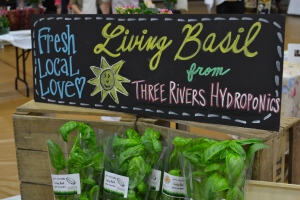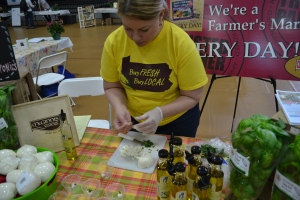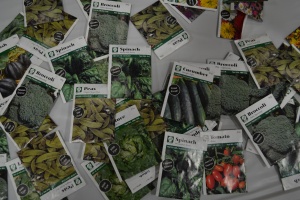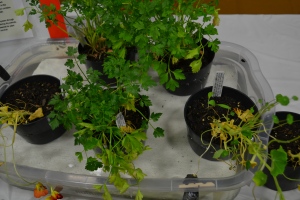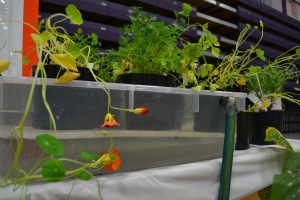Upon entering Chatham University’s Athletic and Fitness center this past weekend, May 4th, I was overwhelmed by the amount of tables set up by local organizations and food vendors. Being quite an introvert myself, having to actually walk up to one of these tables and have a conversation amongst the various hands reaching in for business cards and passing comments seemed impossible. I spent quite a bit of time walking around listening to others conversations with the vendors until I saw a sign reading “Living Basil from Three Rivers Hydroponics.”
This immediately caused me to pause and sift through my short list of known environmental terms but hydroponics was nowhere to be found. I was immediately engaged. After taking some time to talk to one of the employees of Steel City Farms (the vendors of the basil), I learned that hydroponics is a process of growing plants in water or stones along with added nutrients rather than in dirt or soil. I was baffled by this idea. I grew up around my grandparents and parents gardening and discussing the nutrients of the soil and how important that was but gardening in water? That just seemed impossible!
After our brief but informational conversation, and a lovely sample of fresh cheese, basil, and olive oil, I needed to learn more about this process of hydroponics. I walked away from the table feeling somewhat more educated but definitely intrigued to learn more. After shuffling through more tables and flyers and food samples, I came across another table with a sign reading “Aquaponics.” Could Aquaponics and Hydroponics be the same? Could they at least be closely related?
As I approached the table, I was excited to have this opportunity to learn more but I could definitely tell that there were some major differences between hydroponics and aquaponics, the most obvious being that there was a fish living in one of the tanks. The table was set up by Floriated Interpretation, a local company specializing in the process of aquaphonics, and had a real life working display of the aquaphonic process along with a diagram explaining how exactly this process was working:
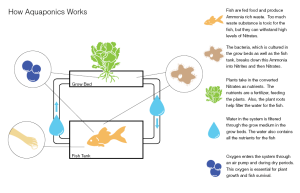
According to Elaine Price, the director of the aquaponic movement within Floriated Interpretations, the company hopes to use this process of aquaponics to bring food to low-income families. Upon further questioning, this actually makes a lot of sense. First of all, aquaponics can grow produce year round in any indoor space so special structures, such as green houses, would not be necessary. Secondly, in an addition to producing plant based produce such as peas, cucumbers, tomatoes, etc., since the aquaponic process also includes fish, the fish can be raised and eaten, providing another protein source for consumers.
Aquaponics are also extremely easy to set up in your own home and, as said before, can be a source of fresh food year round. For more info on how to set up your own aquponic garden, theaquaponicsource.com is a great place to start.
So, in the end, the Food in Our Neighborhoods event turned out to be extremely informational and definitely very interesting. Learning about hydroponics and aquaponics was really eye opening for me and has given me quite a few ideas about how I can plant edible plants in my apartment. As a vegetarian, I’m definitely leaning towards exploring hydroponics for my own use, but more research will definitely be a part of my decision making in embarking on this adventure of alternative gardening!
Sources:
Price, Elaine . Personal Interview. 4 May 2013.
Steel City Farms, . Personal Interview. 4 May 2013.
“The Aquaponic Gardening Blog.”theaquaponicsource.com . N.p., n.d. Web. 10 May 2013. <http://theaquaponicsource.com/blog/>.
“The Hazelwood Aquaponic Project .”www.floriated.com/. N.p.. Web. 5 May 2013. <http://www.floriated.com/hazelwood-hydroponic-project.html>.
“Three Rivers Hydroponics .”threerivershydroponics.com. N.p., n.d. Web. 5 May 2013. <http://threerivershydroponics.com.p8.hostingprod.com/living_basil_care>.
